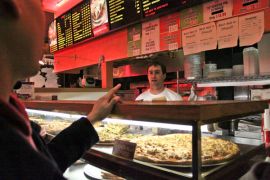While some students stumble home after a Friday or Saturday night out, others are working into the early hours of the weekend. Contributing Writer Brittany Gilpin discovers what it’s like to work the counter at Sammy’s Pizzeria at 1 a.m.

It’s shortly after midnight, and the presence and chatter of college students on The Commons is scarce. As the clock ticks closer to 1 a.m., the sound of footsteps moving down the concrete pavement amplifies. Junior Billy Dunn knows he only has 20 more minutes of serenity.
At 1:12 a.m., the line at Sammy’s Pizzeria stretches outside the door and beyond its neon signs, but Dunn remains cool, calm and collected as customers stumble to the counter and slur their orders for buffalo chicken or chicaboli pizza.
Dunn has been serving pizza at Sammy’s during the Saturday 5 p.m. to 2:30 a.m. shift since October and has witnessed plenty of chaos, commotion and intoxication from behind the pizzeria’s glass food display cases once the local bars announce last call.
“It’s not very busy in here until around 1 a.m. when the bars close,” Dunn said. “After that, it gets pretty loud and crazy.”
Sammy’s use of college employees during the late-night shifts is not coincidental. The restaurant, fully aware of its late-night market, hires college students for the shifts because of their ability to relate to people their own age. Currently, Sammy’s employs between five and 10 college students.
“I don’t really like it,” Dunn said about working on the weekends. “But the last two hours of work go by really fast.”
Saturday night’s showing did not fail to disappoint:
A couple — who had just met earlier that evening at a local bar — stumbled into a booth in the back to discuss engagement plans, while another group belted the lyrics to Jessica Simpson’s “I Wanna Love You Forever.”
One man approached two women in a corner booth.
“Are you guys sisters?” he asked. “You look a lot alike!”
“Um, no,” the 18-year-old responded.
Later, he found out they were 28 years apart in age — and not even related.
Dunn is certainly qualified to comment on the chaos. He said he interacts with customers as both a cook and cashier. He said there is definitely a difference between the customers before and after the bar rush.
“Before the bars, they’re more friendly,” he said. “Everyone’s different when they’re drunk. Sometimes they’re friendly, sometimes they’re pushy, and sometimes they just can’t make a decision.”
Dunn said the indecisiveness is one of the most frustrating parts of his shift.
“Sometimes you just have to get them going,” he said. “You have to ask what they want a couple of times.”
Getting customers through the line isn’t the only thing to worry about at 1 a.m. With only one bathroom in the establishment, hoards of people crowd around the one door, making a line that is impossible to walk around.
Dunn said he spends most of the rush reminding people of what they ordered.
“People think they ordered three slices but only say two,” he said. “I’ll put two out, and they say they need another one, so we always compensate for that. If I miss a slice, I’ll put another one in. You have to be pretty flexible.”
Sophomore Hayley Stormon works late nights alongside Dunn. She said sometimes being stern is the only way to quickly and efficiently serve each customer.
“Sometimes I get brisk, but I try to get everyone to pay for what they ordered,” she said. “Sometimes they’ll wander away without paying. I get kind of angry.”
Alex Susskind, associate professor for Food and Beverage Management at Cornell University’s School of Hotel Administration, said quality customer service is important at any hour for businesses located in a college town.
“If you operate in a college town, you rely on college students for your business,” he said. “It’s very important that you understand and serve your market.”
Jasmine Tourance, a cook and day-time manager for Sammy’s, said customer service is an important part of the restaurant’s philosophy.
But Dunn said the inebriated customers who frequent the pizzeria can help or hurt business.
“It’s definitely a positive in terms of selling pizza because everyone’s inhibitions go to the wind and they’ll order four chicaboli slices,” he said. “But there’s so many people in a small space. People get into fights, and there’s lots of confusion. It’s chaos.”
Susskind said coming up with ways to speed up service and having pizza ready to serve is vital in handling both the mess and the crowd.
“It’s not unknown to Sammy’s,” Susskind said. “They know at 1 a.m. it’s going to be busy, so they get ready for that.”
As each customer painstakingly chooses a type of pizza, Dunn remains unfazed and composed as he serves each one as quickly and accurately as possible. Dunn said being a college student himself allows him to be understanding of his customers.
“I’ve been on the other side of the counter,” he said. “I guess that common ground helps me to cut them some slack.”




